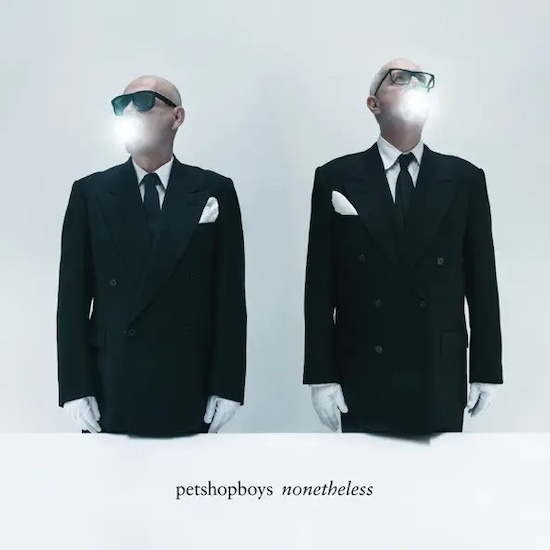Just as greater trans visibility has broadened our conceptions of queerness, the ebbing of the AIDS epidemic as a daily lived reality (for those who can afford the care) has caused many of us to consider the less explored hinterlands of late middle-age. Uniquely positioned to limn the complications of gay life because as artists they drew energy from rather than identifying with youth culture, the Pet Shop Boys are the elegists of autumn, the orchestrators of wry electronic symphonies, and devoted rummagers of dance beats past and present. Their fifteenth album Nonetheless doesn’t measure up to the friskier mid-’10 releases Electric and Super – the melodies are often wan and Neil Tennant’s delivery is uncharacteristically stilted – but the Boys are old friends. They amuse and move us. Their foibles are familiar.
How and when to dance exerts a new fascination for Tennant (about Lowe there’s never been doubt). They use sequencers like Ed Sheeran uses acoustic guitars. The horn fanfare on ‘Why Am I Dancing’ introduces a skittish Neil. “Why am I here?” he asks in its opening line as if he’d been dropped off at a marijuana dispensary. Afloat on a 1985-era bass synth and sampled stu-stu-stuttered vocal, ‘Dancing Star’ can work as a remembrance of oglings past or a bulletin of the latest boy beauty to catch Tennant’s sharp eye, an eye always as likely to break a stare in embarrassment (the ersatz cleverness of the couplet “Dancing star / More power than a czar” should’ve gotten him a good shaking). But pleasure whether experienced or secondhand is best deepened with rue. The Technicolor string swirls in ‘The Secret of Happiness’ recall past triumphs like ‘It Always Comes As a Surprise’, though his character leans on self-pity instead of wit: he could be Andrew Scott’s sad sack from All of Us Strangers subsisting on fantasy as if self-reliance weren’t an option.
Nonetheless, what makes this album listenable is Tennant’s thin but still lovely voice: an instrument of always-surprising emotional complexity. Over Lowe’s oomba-oomba electro-thud and a complementary string section of ‘Feel’ he offers a series of confessions before the big one: multi-tracked Tennants intoning “I will never let you down!” Like hero Dusty Springfield, he can’t speak his mind without worrying if he fucked up. On closer ‘Love is the Law’ his usual preoccupations coupled with a man’s normal anxieties about aging produce a grand ballad that would make an appropriate career closer.
But don’t count on Tennant and Lowe retiring over claret and volumes of Auden’s poetry. Thanks to Saltburn’s use of ‘Rent’, a new generation has discovered how Pet Shop Boys’ mix of the abject, the lustrous, the honest, and the danceable codes as adultness of a particularly tuneful, kinetic kind. Nonetheless will attract few of them. This album is for listeners like me for whom their songs have provided the soundtrack for getting ready to go out after the disco nap, for whom their songs have commented on life’s compromises. The Pet Shop Boys are the poets of meek adjustments. Besides, who else in pop would allude to A Hard Day’s Night? Artists who’ve scrutinized their adulthood lit by the glow of the mirrorball, that’s who.


